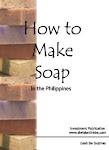Dangerous Ingredients to Avoid in Cosmetics and Possible Negative Side Effects
Several chemicals which are used in common, popular cosmetics are known irritants and carcinogens (chemicals proven to cause cancer). Concern stems from the knowledge that most of these ingredients are derived synthetically or from petroleum. Avoiding these substances serves to decrease overall exposure to harmful or irritating cosmetic ingredients.
Artificial Colours - FD&C, derived from coal tar - Dyes are a risk to asthmatics, eczema sufferers and people sensitive to aspirin - Causes hyperactivity in children, severe headaches, blurred vision and itchy/watery eyes and nose (Antczak, 2001).
Benzoates - Benzoates Benzoic acid, sodium benzoate or parahydroxy benzoate - Used as a preservative in cosmetics and fizzy drinks. Causes gastric irritation, numbing of the mouth and aggravates asthma (Antczak, 2001).
DEA, MEA, TEA - Causes allergic reactions, irritating to eyes and dries out hair and skin (Fairley, 2001).
Dibutyl phthalate - Found in all persons tested by the CDC (Center for Disease Control, USA) in a 2000 Fall study - Highest levels were found in women of reproductive age - Causes birth defects in animals, and damaging to the male reproductive system (ABC News, Internet Ventures 2000) - Used in cosmetics to assist the absorption of other ingredients.
Formaldehydes - Preservative - Causes skin reactions - Imidazolidinyl urea is the second most identified preservative causing contact dermatitis (Fairley, 2001)
Keratolytic chemicals - Such as hydroxyl acids, retinoic acid - Corrosive, used in skin peels - Dissolves the stratum corneum of the epidermis, making skin more sensitive to sun damage - Accelerates production of dead skin cells; the skin thickens to repair its surface so that vulnerable skin cells underneath are protected from the effects of skin peeling. (Antczak, 2001).
Parabens - Petroleum product - Triggers skin irritations and may be an xerestrogen (Fairley, 2001). May play a role in falling sperm counts and rising breast cancer rates (Fairley, 2001). Used in 99% of all commercial cosmetics (Fairley, 2001)
Sodium laureth sulfate, sodium lauryl sulfate - Forms carcinogenic nitrogen compounds when combined with specific ingredients - Irritating to eyes, skin and lungs (Antczak, 2001) - Harmful if swallowed and may cause damage to eyes (Antczak, 2001)
This is an excerpt from Revitalize website from Australia.




No comments:
Post a Comment